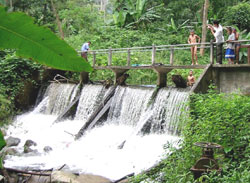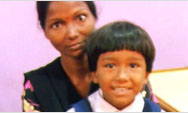You are here » Home » Telling Our Story
Case Study
New regulations allow small energy generators to sell excess electricity to national utilities
Renewable Energy Boosts Economy

| |
Photo: Chris Greacen, Palang Thai
|
|
Small-scale producers in Thailand are tapping alternative energy sources, including water, to reduce air pollution and decrease the country's reliance on energy imports.
"Our outreach efforts have led to at least 3 MW of additional planned installations in Thailand - enough electricity for 12,000 homes," says Palang Thai's Chris Greacen. "USAID's support throughout has been essential to our efforts."
|
Challenge
Thailand currently relies on imports, mainly crude oil, to satisfy about half of its energy needs. With a view to reducing pollution and strengthening energy security and competitiveness, the country is increasingly exploring ways to meet growing consumer and industrial needs with domestic renewable resources. Water, solar, wind, biomass and biogas generation are economically viable and could meet more than a tenth of Thailand's demand. Adopting these technologies, however, has been limited by various obstacles, including a lack of support for small-scale renewable energy producers, who were not allowed to sell electricity to utilities due to concerns about safety and compatibility.
Initiative
With assistance from USAID, a group of volunteers drafted legislation in 2002 to allow small community- or entrepreneur-owned renewable energy generators to connect to the grid and sell excess electricity to utilities. Due in part to dialogue sparked by a USAID-sponsored study tour to the United States and training course in Bangkok for government representatives, the new regulations were approved later that year. USAID helped supply expertise and guidance through a partnership with California-based utilities with substantial experience in small-scale renewable energy. USAID also supported the organization Palang Thai in ensuring smooth implementation of the new regulations by supplying energy experts to work with the government on policy, and helping small-scale generators resolve technical and contractual barriers.
Results
The new legislation has encouraged the development of clean energy resources while improving Thailand's environment, building local economies and reducing reliance on imported fuels. Eight small-scale generators have started to sell power to the national grid, while more than 40 others, with a combined generating capacity of over 6 MW, have been given permission to connect to it. With this steady increase in renewable energy sources coming on line, the Thai government is now expanding the regulations to include larger renewable energy generators that can produce up to 5 MW.
Print-friendly version of this page (244kb - PDF)
Click here for high-res photo
Back to Top ^ | 

